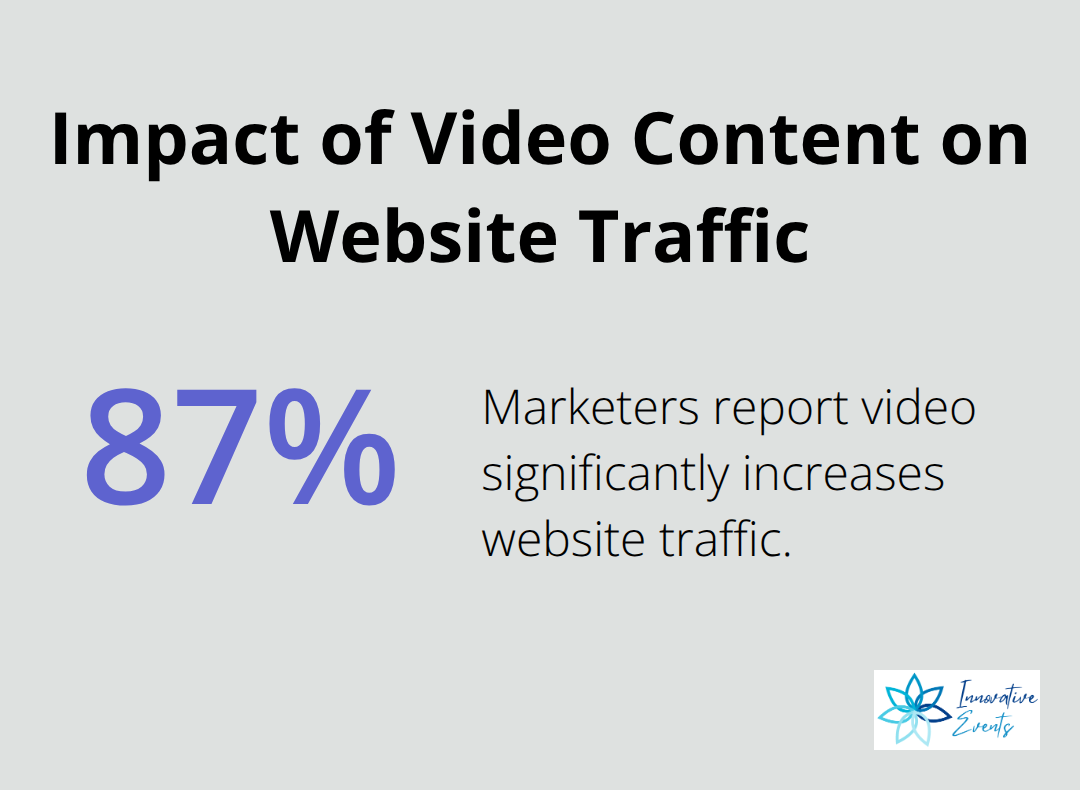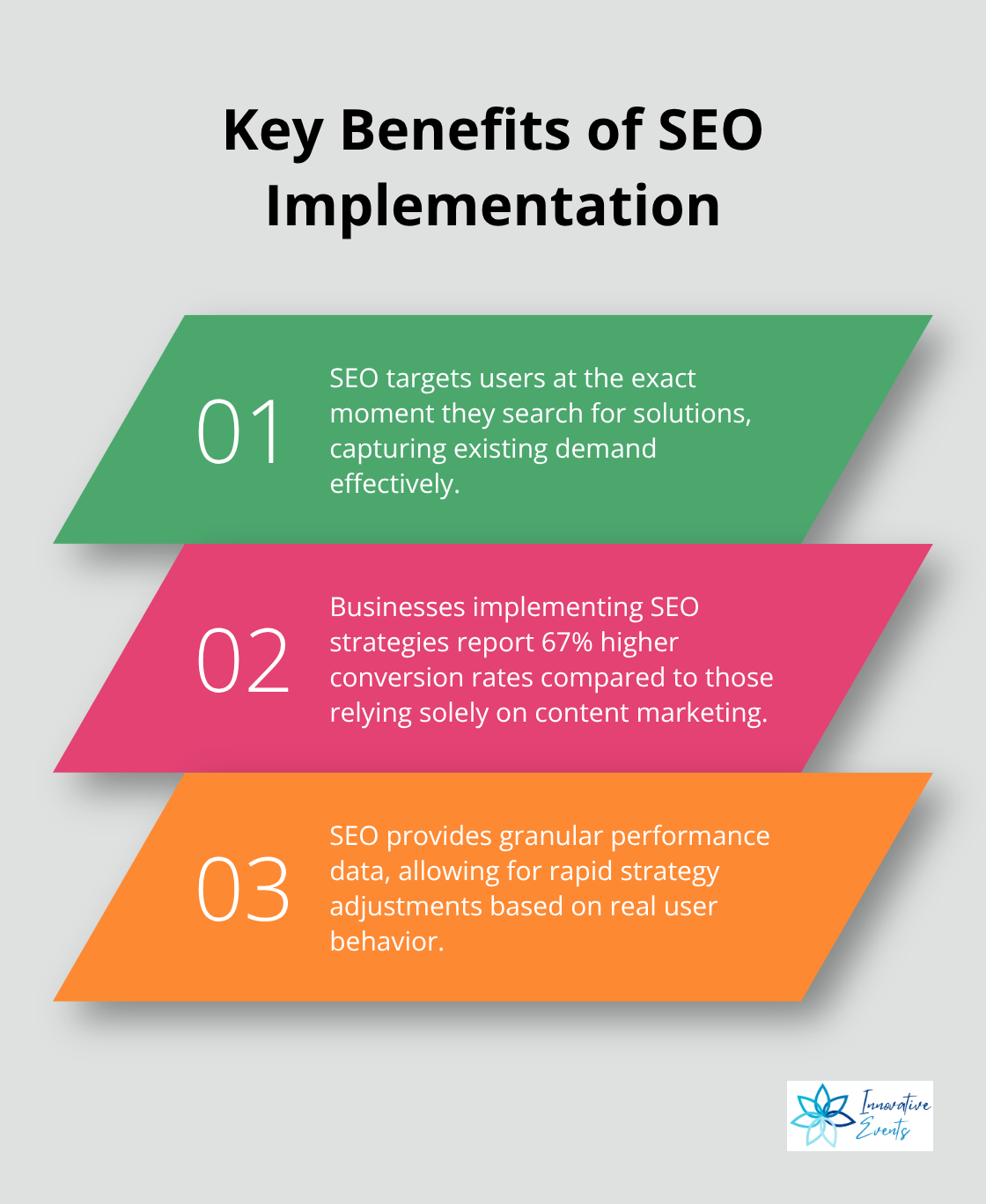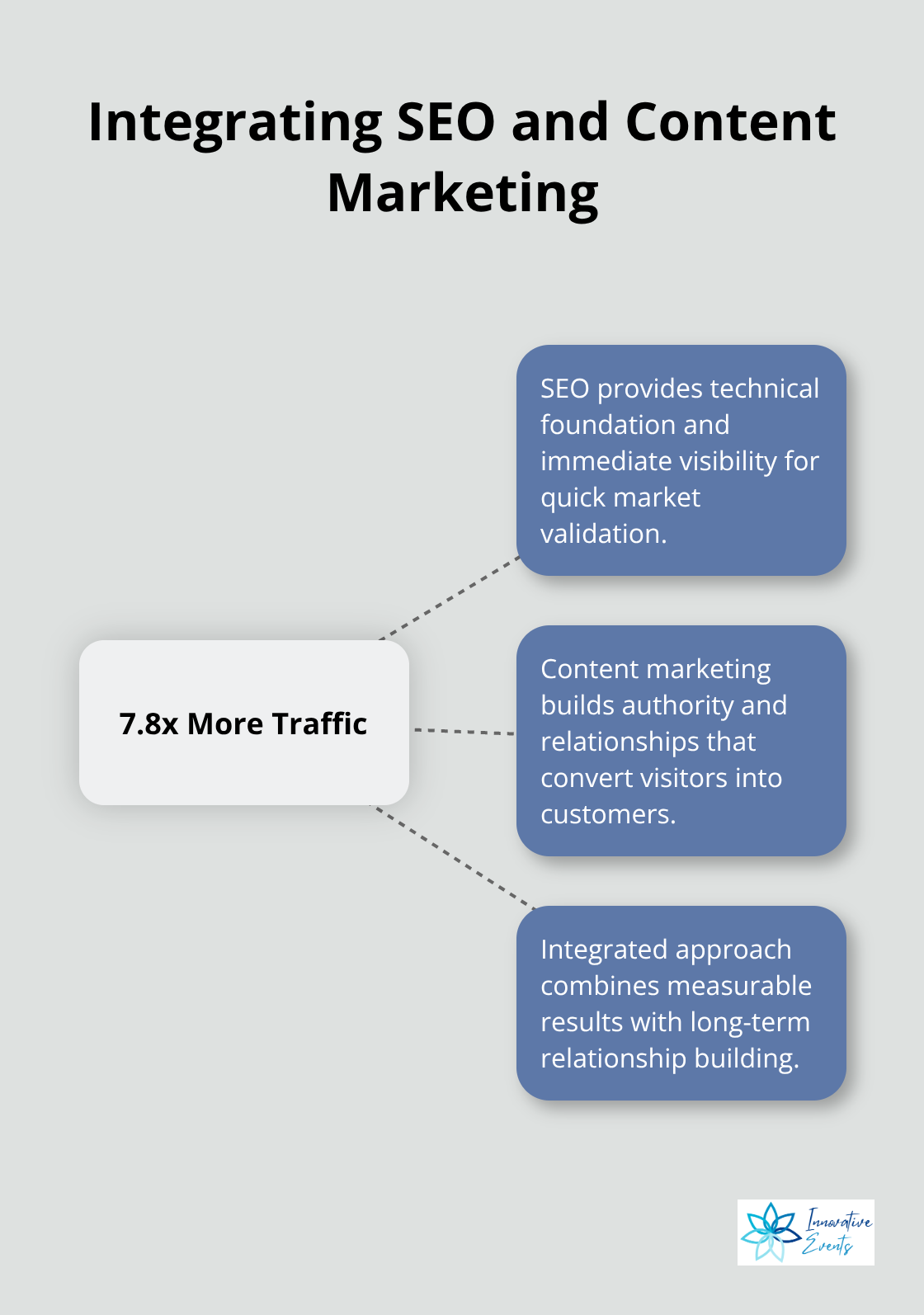Marketing teams face a common dilemma when allocating their digital budgets. The content marketing vs SEO debate continues to divide professionals across industries.
At Innovative Events, we’ve analyzed both strategies extensively through our client campaigns. Each approach offers distinct advantages, but the real question isn’t which one wins-it’s how to leverage both effectively for your specific business goals.
Why Content Marketing Builds Lasting Business Value
Content marketing operates on a fundamentally different principle than traditional advertising. Instead of interrupting potential customers, it attracts them by providing genuine value. McKinsey & Company research shows that 57% of B2B sellers find marketing content generic and unresponsive, which creates a massive opportunity for brands that produce authentic, helpful material. Businesses transform their market position through strategic content creation that addresses real customer problems.
Content Creates Authority Through Expertise
Companies that publish consistent, expert-level content position themselves as the go-to source in their industry. Businesses that maintain active blogs have 434% more indexed pages than those without. This increased visibility translates directly into credibility. When prospects search for solutions, they encounter your expertise first. The key lies in answering specific questions your audience asks, not promoting your services. Technical tutorials, industry analysis, and problem-solving guides establish your team as knowledgeable professionals worth trusting with significant business decisions.
Audience Engagement Drives Conversion Rates
Content marketing generates leads more efficiently than outbound marketing approaches. This efficiency stems from targeting people who already seek solutions. Video content particularly excels at engagement, with 87% of marketers reporting that video significantly increases website traffic. Interactive content formats like webinars, calculators, and assessments create deeper connections with prospects. The most successful content addresses specific pain points your ideal customers experience and provides actionable solutions they can implement immediately.

Long-term Relationships Generate Revenue
Content marketing ranks as the third most significant source of customer retention because it maintains ongoing value delivery. Unlike paid advertising that stops working when budgets end, quality content continues to attract and nurture prospects for years. Regular publication schedules keep your brand visible during extended sales cycles. Educational content series guides prospects through complex decision-making processes and build trust that converts into long-term client relationships and referrals.
While content marketing excels at relationship building and authority establishment, SEO takes a different approach to digital visibility.
Why SEO Delivers Immediate Measurable Results
SEO operates as a precision instrument for digital visibility, targeting users at the exact moment they search for solutions. Unlike content marketing’s relationship-building approach, SEO captures demand that already exists. Google processes approximately 16.4 billion searches daily, and 75% of users never scroll past the first page of results. This creates a winner-takes-all environment where top rankings generate exponential traffic increases. Companies that secure first-page positions for competitive keywords often see traffic jumps of 200-400% within six months.

Search Traffic Converts at Higher Rates Than Any Other Channel
Organic search visitors convert 14.6% better than visitors from social media or paid advertising because they arrive with specific intent. When someone searches for “event marketing services Denver,” they actively seek solutions, not browse casually. This intent-driven traffic explains why businesses that implement SEO strategies report 67% higher conversion rates compared to companies that rely solely on content marketing. Search Console data reveals that websites that optimize for local SEO terms see 5x more qualified leads than those that focus only on broad industry keywords.
Performance Tracking Provides Actionable Business Intelligence
SEO delivers granular performance data that content marketing cannot match. Search Console shows exactly which keywords drive traffic, which pages perform best, and where optimization opportunities exist. This data enables rapid strategy adjustments based on real user behavior rather than assumptions. Businesses that use SEO analytics tools identify content gaps that generate 40% more qualified leads when filled strategically. The measurable nature of SEO allows marketing teams to calculate precise ROI figures and justify budget allocations with concrete evidence.
Technical Optimization Creates Compound Growth
Technical SEO improvements like page speed optimization and mobile responsiveness directly impact conversion rates. Case studies from sites like Vodafone, Yelp, and eBay show how even milliseconds can impact bounce rates, conversion rates, and ultimately your bottom line. These technical foundations create compound effects where small improvements multiply across thousands of page views. Sites with proper technical SEO see sustained traffic growth that builds momentum over time, unlike paid advertising that requires constant budget allocation.
Both SEO and content marketing offer distinct advantages, but their effectiveness varies significantly based on timeline expectations and resource allocation.
Which Strategy Delivers Faster Business Results
Content marketing and SEO operate on completely different timelines that directly impact budget plans and resource allocation. Content marketing requires 6-12 months to generate meaningful traffic increases, while SEO can produce measurable results within 4-6 months for properly optimized campaigns. HubSpot data shows that regular content updates increase monthly organic search views by 106%, but this growth compounds slowly over time. SEO improvements like page speed optimization and keyword focus generate immediate traffic spikes that often double within the first quarter.
Budget Allocation Determines Success Speed
SEO demands higher upfront investments but delivers predictable returns through technical optimization and keyword research. Content marketing spreads costs over longer periods through consistent publication schedules and content creation resources. SEO tools cost $100-500 monthly for comprehensive tracking, while content creation requires $2,000-5,000 monthly for professional-grade material that competes effectively.
Performance Measurement Reveals True ROI
SEO provides granular performance data through Search Console metrics that track keyword rankings, click-through rates, and conversion paths with mathematical precision. Content marketing ROI calculations rely on engagement metrics and brand awareness surveys that lack the specificity of search analytics. Businesses that use SEO analytics identify revenue attribution within 30 days, while content marketing impact assessment requires a 6-month minimum tracking period. Companies that prioritize SEO measurement report 67% higher conversion rates because they optimize based on actual user behavior rather than content engagement assumptions.
Resource Requirements Shape Strategy Selection
SEO teams need technical specialists who understand code, site architecture, and search algorithms. Content marketing requires writers, designers, and strategists who create compelling narratives and visual assets. Most businesses cannot afford both specialized teams simultaneously, which forces strategic choices about resource allocation. Companies with technical backgrounds often excel at SEO implementation, while creative organizations typically achieve better content marketing results through their natural storytelling abilities.
Final Thoughts
The content marketing vs SEO debate misses the fundamental point that both strategies work exponentially better together than in isolation. Companies that integrate both approaches see 7.8 times more traffic than those that use either strategy alone. SEO provides the technical foundation and immediate visibility, while content marketing builds the authority and relationships that convert visitors into customers.

Your business goals should determine the initial focus. Startups that need quick market validation benefit from SEO’s measurable results and faster timeline. Established companies that build thought leadership gain more from content marketing’s relationship-building capabilities (though the most successful businesses eventually implement both strategies as complementary systems).
Start with your strongest capability and expand gradually into the complementary strategy. Technical teams should begin with SEO fundamentals like site speed optimization and keyword research. Creative organizations should focus on content creation that addresses specific customer problems. We at Innovative Events combine SEO optimization with compelling content creation through our comprehensive marketing services to deliver measurable results for clients who want to thrive in competitive markets.

